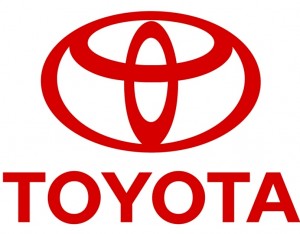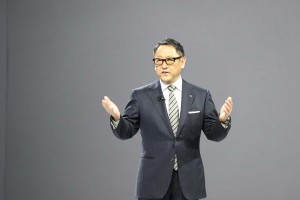Even while celebrating yet another record annual profit officials at Toyota Motor Corp. put a bleak face on, warning that profits for the current fiscal year are likely to fall by 35% or more.
The auto industry’s sales leader expects to be hit hard by the growing strength of the Japanese yen. And it also could feel the brunt of plant closures and cutbacks caused by the damaging earthquake that hit the southwestern part of the country last month.
The automaker had been able to drive profits to record levels three years in a row largely due to the “tailwind” of a weak yen said Toyota President and CEO Akio Toyoda. “Since the start of the year, the tide has changed,” he added.
For the fiscal year that ended on March 31, 2016, Toyota earned 2.3 trillion yen, or $21 billion, a 6.4% year-over-year increase. Sales for the fiscal year were up 4%, to 28.4 trillion yen, or $261 billion.
But, in an ominous sign, sales fell 2% during the January-March quarter, to 6.9 trillion yen, or $63 billion. One of the factors that hammered Toyota was the fire at a key Japanese steel supplier that forced production cutbacks at its home assembly plants.
The second quarter didn’t get off to a much better start. While nowhere near as severe as the earthquake and tsunami that struck northern Japan in 2011, the latest series of temblors came in at magnitude 6.5 on April 14 and 7.3 two days later. That caused severe damage in the country’s southern island of Kyushi. Among other things, it quickly led to supply shortages such as electronics modules from digital partsmaker Renesas, as well as tiremaker Bridgestone.
Toyota was forced to suspend most of its Japanese assembly operations from April 15 to 23, with a few plants continuing to be impacted until last week. The disaster was ultimately expected to reduce annual output by tens of thousands of vehicles, even with efforts to boost operations later in the year. Many of those vehicles, including high-margin Lexus models, were bound for export to markets such as the U.S.
Even before the earthquake, Toyota sales had been slipping. The maker sold 8.7 million vehicles worldwide during the fiscal year ending in March, down from 9 million the previous year. While it did gain ground in the surging North American market, it saw declines in Europe and Asia, as well as in Japan where car sales continue to be impacted by sharp consumption tax increases.
(US car sales running at record levels. Click Here for the story.)
Meanwhile, Hiroji Onishi, Toyota’s chief of Chinese operations, warned that “It is becoming more difficult” to meet that country’s tightening emissions and fuel economy regulations, something that could cause it to lose momentum there.
Toyota is forecasting sales will rebound to 8.9 million in the current fiscal year, which runs through the end of March 2017. But for the calendar year to date, it actually has slipped behind rival Volkswagen AG for the global sales crown. That came as a surprise to many analysts because VW has itself been hurt by a diesel emissions cheating scandal.
(Toyota among the many automakers likely hit by huge increase in Takata airbag recall. Click Here for the latest.)
While the impact of the earthquake is expected to be largely past tense, Toyota has a more serious issue to deal with going forward.
“Earnings result in the past few years have been largely helped by foreign exchange rates,” noted CEO Toyoda. But for each 1 yen increase in value against the dollar, Toyota’s profits slip by 40 billion yen. The problem is exacerbated by the fact that Toyota produces more vehicles in the home market than key competitors such as Honda and Nissan.
There is no “magic wand,” nor “clever scheme” to overcome that foreign exchange problem, added Toyota Executive Vice President Takahiko Ijichi, during a meeting with reporters. Nonetheless, the company is aiming to maintain at least a 5% profit margin and expects to keep posting an operating profit as long as the exchange rate remains better than 85 yen to the dollar or 100 to the Euro.
The weak fiscal year forecast comes as another setback for investors who have seen Toyota shares slip by around a quarter since the beginning of this year. Toyota announced Wednesday that it will attempt to buoy its stock with a new share buyback of as much as $4.6 billion.
(Toyota among many automakers looking to expand sales of hydrogen cars. Click Here for more.)



I hope we may cover up this gap in the last two quarters to meet our target and to sustain the brand loyality. Would it also impact the after sales service NPS ( net promotors score). Regards, Syed Minhas Ali Toyota Saudi Arabia.